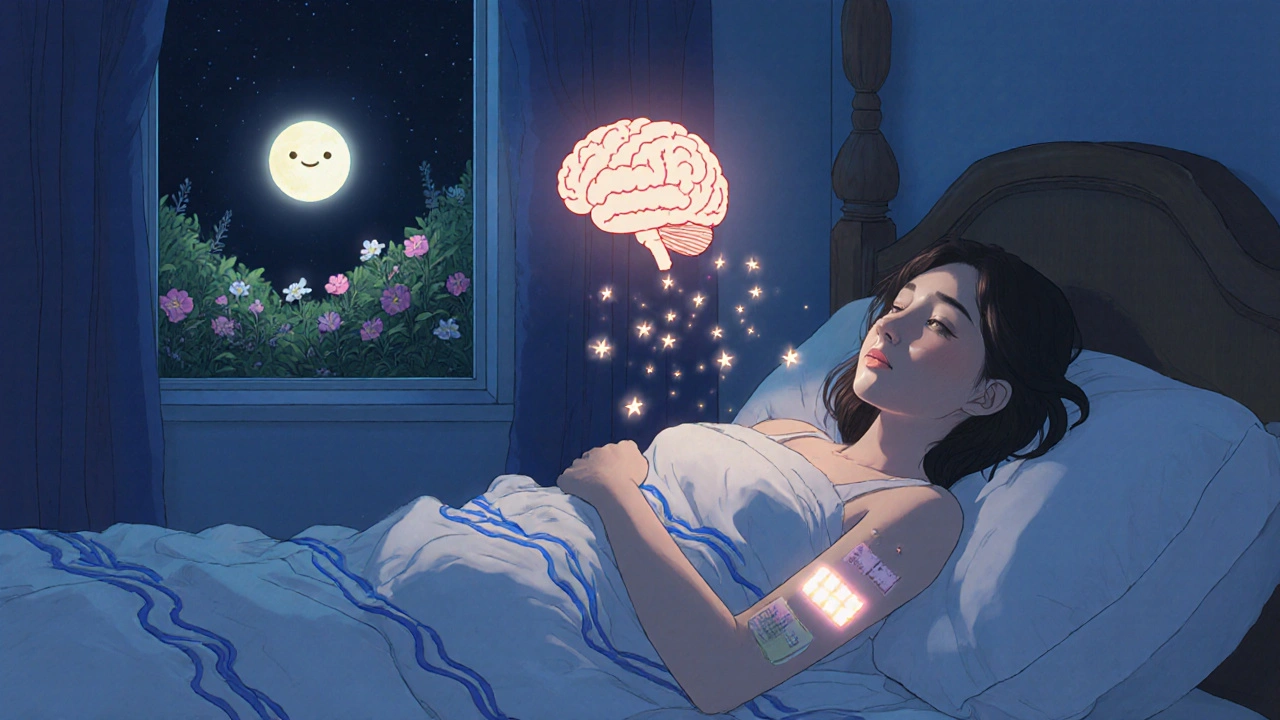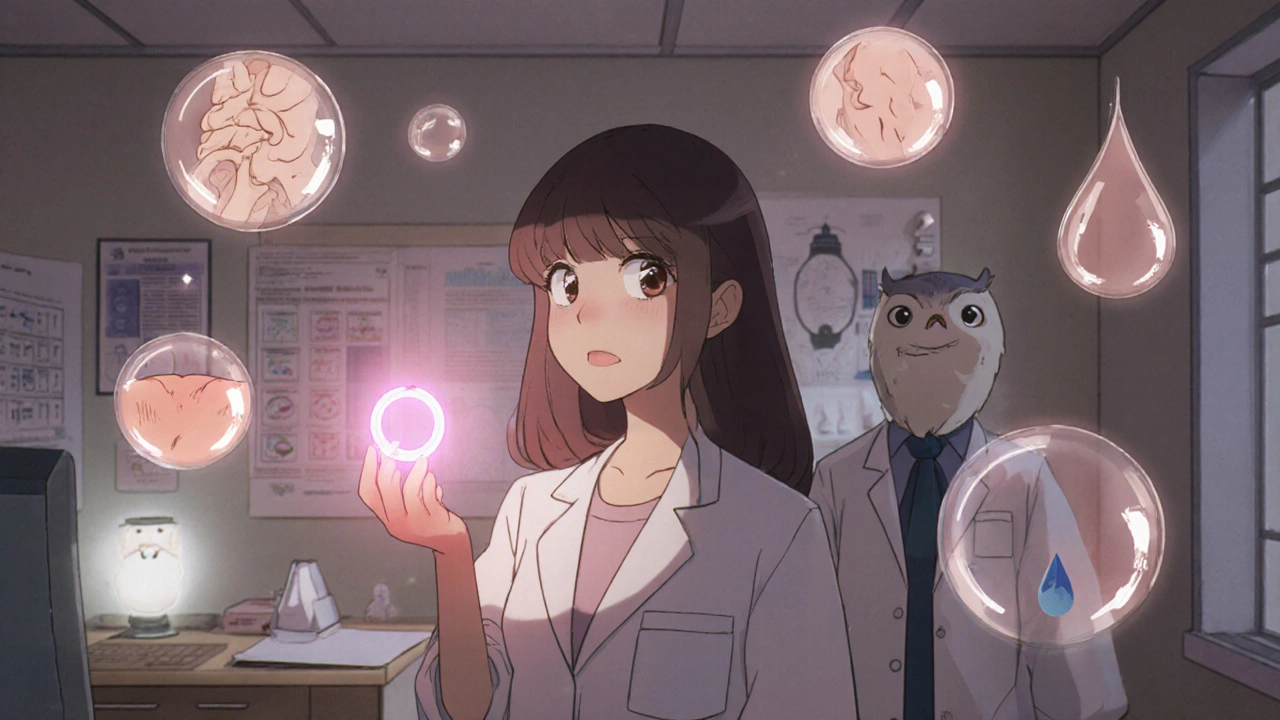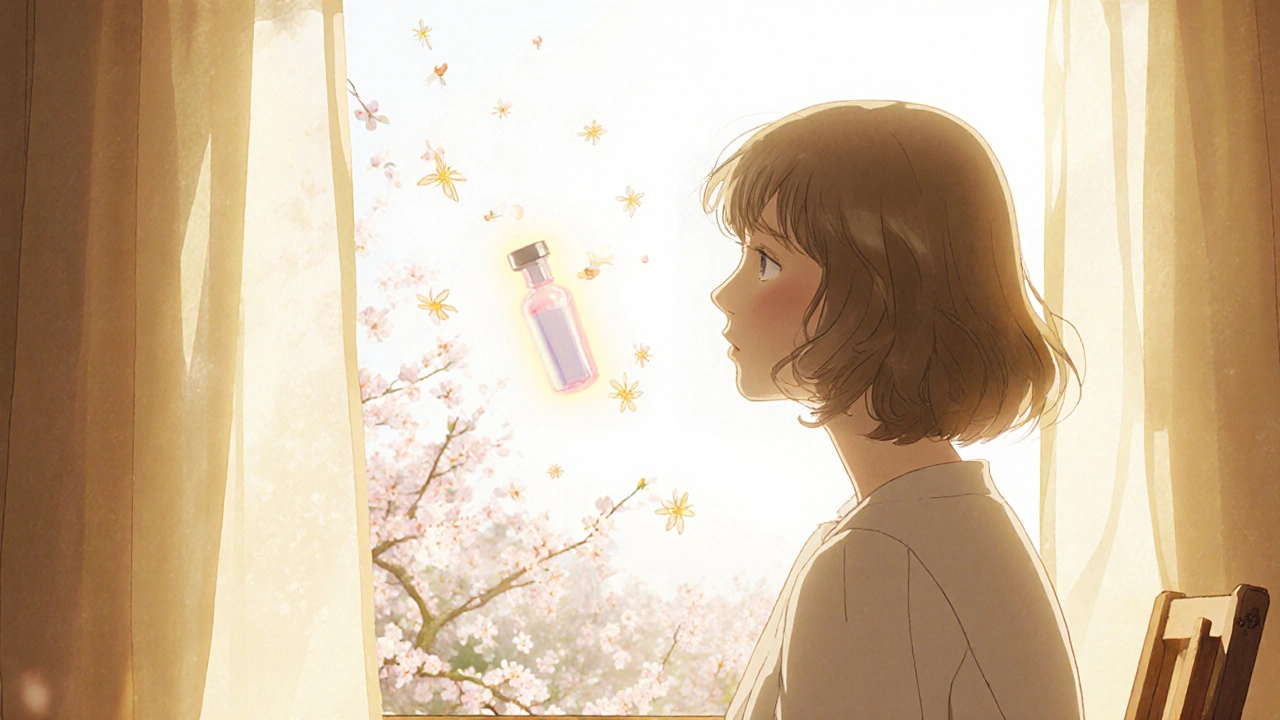When menopause hits, it doesn’t just bring hot flashes. Many women face sleepless nights, brain fog, dry skin, mood swings, and even joint pain. These aren’t just inconveniences-they can make daily life feel like a constant struggle. For decades, estradiol has been one of the most effective tools doctors use to ease these symptoms. But it’s not a one-size-fits-all solution. Understanding how estradiol works-and who it helps most-can make all the difference.
What is estradiol, really?
Estradiol is the strongest form of estrogen your body naturally makes. Before menopause, your ovaries produce it in large amounts to regulate your menstrual cycle, keep bones strong, support skin elasticity, and even influence your mood. When you hit menopause-usually between 45 and 55-your ovaries slow down. Estradiol levels drop by up to 90%. That sudden drop is what triggers most menopause symptoms.
Estradiol therapy replaces what your body no longer makes. It comes in pills, patches, gels, sprays, and vaginal rings. Each form delivers the hormone differently, and the right one depends on your symptoms, lifestyle, and health history. For example, if hot flashes and night sweats are your main issue, a patch or gel might work better than a pill because it avoids the liver and gives steadier levels.
How estradiol reduces key menopause symptoms
Let’s look at the most common symptoms and how estradiol helps:
- Hot flashes and night sweats: Estradiol works on the hypothalamus-the part of your brain that controls body temperature. When estrogen drops, your hypothalamus gets confused and thinks you’re overheating. Estradiol restores that balance. Studies show it reduces hot flashes by 75-90% in most women.
- Vaginal dryness and discomfort: Low estrogen thins the vaginal lining, making sex painful and increasing urinary infections. Vaginal estradiol creams or rings restore moisture and elasticity. Many women notice improvement within weeks.
- Bone loss: Estrogen protects bone density. After menopause, women can lose up to 20% of their bone mass in the first five years. Estradiol slows this loss. The North American Menopause Society says hormone therapy is the most effective way to prevent osteoporosis in younger postmenopausal women.
- Mood swings and brain fog: Estrogen affects serotonin and dopamine, the brain chemicals tied to mood and focus. Many women report clearer thinking and fewer tears or irritability after starting estradiol.
- Skin and hair changes: Estradiol helps maintain collagen, which keeps skin plump and hair thick. Women on estradiol often notice less dryness and fewer wrinkles.
Who benefits most-and who should avoid it
Estradiol isn’t for everyone. But for many, the benefits outweigh the risks.
Women under 60 or within 10 years of menopause tend to get the best results with the lowest risk. That’s when the body still responds well to hormone replacement, and the protective effects on the heart and bones are strongest.
But if you have:
- A history of breast cancer
- Unexplained vaginal bleeding
- Active blood clots or a high risk of stroke
- Severe liver disease
then estradiol is usually not recommended. Your doctor will check your personal and family history before starting treatment.
Some women worry about cancer risk. The largest study on this-the Women’s Health Initiative-found that estradiol alone (without progestin) slightly increases breast cancer risk only after 10+ years of use. But for women who’ve had a hysterectomy, estradiol alone carries no extra breast cancer risk. And for most women under 60, the risk is very small compared to the symptom relief.

Types of estradiol therapy: Which one works best?
Not all estradiol is the same. Here’s how the main forms compare:
| Form | Best For | Pros | Cons |
|---|---|---|---|
| Pills | Women with hot flashes, mood issues | Easy to take, affordable | Processed by liver; higher clot risk |
| Patches | Women with liver issues or clot risks | Steady hormone levels, lower liver strain | Can fall off; skin irritation |
| Gels or sprays | Women who hate pills or patches | Quick absorption, no liver first-pass | Must wait before showering or dressing |
| Vaginal creams/rings | Women with dryness or urinary symptoms | Local effect, low systemic absorption | Doesn’t help hot flashes or bones |
Many women start with a low-dose patch or gel. If symptoms are mostly vaginal, a ring or cream may be all they need. Your doctor can help you choose based on your symptoms and risk profile.
How long should you take estradiol?
There’s no fixed timeline. Some women take it for 2-3 years to get through the toughest symptoms. Others stay on it for 5-10 years, especially if they started early and have no risk factors.
The key is regular check-ins. Every 6-12 months, your doctor should review:
- Are your symptoms under control?
- Do you still need the same dose?
- Any new health changes?
Many women can lower their dose over time or switch to a non-hormonal option once symptoms ease. Stopping suddenly can cause rebound symptoms, so tapering off slowly is often better.

What about natural alternatives?
Black cohosh, soy isoflavones, and evening primrose oil are often marketed as “natural estrogen.” But the science doesn’t back them up.
A 2023 Cochrane review found no strong evidence that herbal supplements reduce hot flashes more than a placebo. Soy has mild effects for some women, but it’s nowhere near as reliable as estradiol. And supplements aren’t regulated like medicine-they can vary in strength or contain hidden ingredients.
If you’re looking for non-hormonal options, FDA-approved drugs like paroxetine or gabapentin can help with hot flashes. But they’re not as effective as estradiol and often come with side effects like dizziness or nausea.
Real-life impact: What women say
One woman in her early 50s from Christchurch told her doctor: “I was crying every day. I couldn’t sleep. I felt like I was disappearing.” After three months on a low-dose estradiol patch, she said: “I’m back. I’m sleeping. I’m laughing again.”
Another woman, 58, started estradiol after a hysterectomy. She had severe bone loss and was at risk for fractures. Two years later, her bone density improved by 6%. “I didn’t realize how much I’d lost until I got it back,” she said.
These aren’t outliers. They’re common stories among women who find the right treatment.
Next steps: What to do if you’re struggling
If menopause symptoms are wrecking your life, don’t wait. Talk to your doctor. Bring a list of your symptoms, how long they’ve lasted, and what’s been affected-sleep, work, relationships, mood.
Ask:
- Is estradiol right for me based on my health history?
- What form and dose would you recommend?
- How often should I check in?
- Are there any red flags I should watch for?
Don’t be afraid to get a second opinion. Menopause care has changed a lot in the last 10 years. What was once seen as too risky is now understood as life-changing for many.
Estradiol isn’t magic. But for millions of women, it’s the difference between surviving menopause and thriving through it.
Can estradiol cause weight gain?
Estradiol itself doesn’t cause weight gain. But low estrogen can slow metabolism and increase fat storage around the abdomen. Many women gain weight during menopause because of aging, stress, and lifestyle changes-not because of estradiol. In fact, some women find it easier to manage weight once their hormones are balanced.
How soon does estradiol start working?
Hot flashes and mood symptoms often improve within 2-4 weeks. Vaginal symptoms may take 4-8 weeks. Bone protection takes months to show up on scans. Patience is key, but if you don’t notice any change after 3 months, talk to your doctor about adjusting the dose or form.
Is estradiol safe if I’ve had a blood clot before?
If you’ve had a blood clot in the past, oral estradiol (pills) is usually avoided because it increases clot risk. But transdermal forms-patches or gels-are considered safer because they don’t pass through the liver the same way. Always discuss your clot history with your doctor before starting any hormone therapy.
Do I need progesterone with estradiol?
If you still have a uterus, you need progesterone (or a progestin) along with estradiol. Without it, estradiol can cause the uterine lining to grow too much, raising cancer risk. If you’ve had a hysterectomy, you only need estradiol. Your doctor will confirm which you need.
Can I use estradiol if I’m over 60?
Starting estradiol after 60 increases the risk of stroke and blood clots. But if you started it earlier and are doing well, continuing it may still be safe. For women over 60 with only vaginal symptoms, low-dose vaginal estradiol is often recommended. Never start hormone therapy after 60 without a clear plan and close monitoring.


I started estradiol last year and honestly? My life changed. I used to cry for no reason, couldn't sleep, and felt like a ghost in my own body. Now I'm sleeping through the night, laughing at dumb memes again, and even went hiking with my niece. 🌸💖
Man, I never thought I'd say this, but I'm kinda jealous of women who get to use this stuff. My wife went from zombie mode to full-on human again after three months on a patch. It's wild how one hormone can flip the switch on your whole existence. Like, imagine if we had a pill for being less grumpy after 40. We'd all be rich.
Also, the vaginal cream thing? That's low-key genius. Why is this not on every pharmacy shelf next to Advil?
So you're telling me the solution to menopause is just... hormones? Wow. Next they'll tell us the cure for aging is more caffeine and denial.
My grandma lived to 92 without any of this. She walked 5 miles a day, ate lard, and said "hormones are for weak people."
Why are we still treating menopause like it's a disease? Women have been surviving this for millennia without pills and patches. Now we're medicating normal biology like it's a glitch in the system. I mean, really? You can't just breathe through a hot flash? You need a prescription?
And who approved all this? Big Pharma? Of course they did.
Also your skin gets dry? Use lotion. Your bones weaken? Lift weights. Stop chasing magic bullets.
Empirical evidence is scarce. The WHI data is misinterpreted. The placebo effect is rampant. And the pharmaceutical marketing budgets dwarf actual clinical research. You're not healing. You're being monetized.
Also patches? How quaint. I prefer the word "transdermal". It sounds more scientific and less like something your aunt buys at CVS.
Let me ask you this: if estradiol is so life-changing, why are we still talking about it like it's a miracle cure instead of acknowledging it's a temporary bandage on a societal failure? We don't value women's health until their hormones drop. Then suddenly it's emergency mode. We don't fund research on reproductive health until it's inconvenient. We don't support maternal leave until women are too exhausted to function. And now? We hand them a patch and call it progress.
It's not medicine. It's damage control wrapped in glitter and hope.
And don't even get me started on the "natural alternatives" narrative. That's just capitalism repackaging ignorance as wellness.
I've read every single paper on this. Every. Single. One. And let me tell you - the data is messy. The WHI was flawed. The follow-ups were poorly designed. And the real issue isn't estradiol - it's that we've turned menopause into a medical emergency instead of a natural transition. Women are being pushed into hormone therapy like it's a mandatory upgrade, when in reality, many could manage with lifestyle changes, better sleep hygiene, stress reduction, and community support. But hospitals don't make money off yoga classes or group therapy sessions. They make money off prescriptions. And don't even get me started on how doctors are trained - 45 minutes of med school on menopause? That's not education, that's negligence. And then we wonder why women feel abandoned. You don't fix a systemic problem with a pill. You fix it with time, respect, and investment. Not a gel you apply in the shower while your husband scrolls TikTok.
Okay but the part about vaginal rings being the MVP for dryness? That’s actually brilliant. Like, why is this not the first thing everyone talks about? I’ve got a friend who was in so much pain she stopped having sex for two years. Started a ring - boom, six months later she’s dancing at her daughter’s wedding. No big drama. Just a tiny little ring that fixed what a whole army of creams couldn’t.
Also, the fact that transdermal is safer for clot history? That’s huge. So many women get scared off because they hear "hormones = bad" without knowing the details. This post is actually the most balanced thing I’ve read on this in years.
Hey - if you're thinking about estradiol and you're nervous, I totally get it. I was too. But here's what helped me: I found a menopause specialist (yes, they exist!) and asked ALL the questions. No shame. No rush. We tried a low-dose patch first, tracked my symptoms for 6 weeks, then adjusted. Now I feel like me again - not just "the woman who’s tired all the time."
Also - if you're on a budget, patches are often covered by insurance. And if you're worried about cancer? Talk to your doc about your personal risk. Most women under 60? The benefits win. You're not alone. We've got your back 💪❤️
So I read this whole thing and I’m just sitting here thinking… why do we treat menopause like it’s some secret shame? Like we’re supposed to whisper about it while men get to keep their testosterone boosters and get praised for "staying sharp"?
It’s the same body. Same brain. Same life. But suddenly, when estrogen drops, we’re told to suffer in silence or pop a pill. Why not normalize this? Why not have menopause support groups in every workplace? Why not teach it in high school so girls grow up knowing it’s not a failure - it’s biology?
Also - the patch vs gel thing? That’s gold. I didn’t know that. Thanks for the real talk.
Menopause is just nature's way of saying you're no longer useful. Estradiol is just a fancy way to pretend you're still young. In my village we just let women rest and tell stories. No pills. No patches. No drama. You stop having babies? You become the wise one. Not a patient. Not a problem. Just a person. The West turns everything into a product to sell. Even aging.
My mother lived to 89. She never took a hormone. She drank bitter tea and laughed at the doctors. She was right.